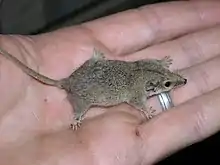paucident planigale
English

A paucident planigale
Etymology
From paucident (nonce borrowing from Latin paucidens (“having few teeth”), apparently not otherwise used) + planigale (“carnivorous marsupial of genus Planigale”). Compare Translingual Paucidentomys.
Noun
paucident planigale (plural paucident planigales)
- Planigale gilesi, a very small species of carnivorous marsupial endemic to desert areas of southern and eastern Australia.
- Synonym: Giles' planigale
- 1982, Michael Archer, Carnivorous Marsupials, Volume 1, Royal Zoological Society of New South Wales, page 255,
- The dasyurids examined were the Paucident Planigale, Planigale gilesi, and the Kowari, […] .
- 1983, Keith Davey, Our Arid Environment: Animals of Australia's Desert Regions, Reed, page 92,
- The Paucident Planigale is a robust marsupial. Its head and body are 6-8 cm long. It has only two premolar teeth in each upper and lower jaw, instead of three as the other four planigales have. The Paucident Planigale has soft, dense, colourful fur.
- 1994, Daniel Lunney, Future of the Fauna of Western New South Wales, Royal Zoological Society of New South Wales, page 86,
- However, for small cryptic species such as the southern ningaui Ningaui yvonneae, narrow-nosed planigale Planigale tenuirostris and paucident planigale P. gilesi, range extensions are probably more apparent than real […] .
Translations
Planigale gilesi
|
See also
- dasyurid
- marsupial mouse
- marsupial shrew
Further reading
 Planigale on Wikipedia.Wikipedia
Planigale on Wikipedia.Wikipedia  Dasyuridae on Wikipedia.Wikipedia
Dasyuridae on Wikipedia.Wikipedia
This article is issued from Wiktionary. The text is licensed under Creative Commons - Attribution - Sharealike. Additional terms may apply for the media files.